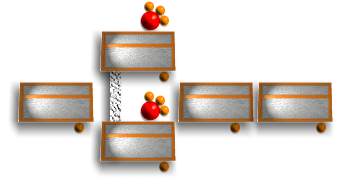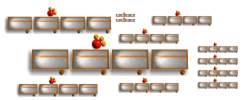hypertext and the linearity of history
People who aren't very familiar with hypertext writing, but who nonetheless want to impress you with their knowledge, often claim that hypertexts are incoherent, that they lack the structure and rigor of conventional, linear prose. For example, Sven Birkerts writes in his Gutenberg Elegies that
Humanistic knowledge . . . ultimately seeks to fashion a comphrensible narrative. It is, in other words, about the creation and expansion of meaningful contents. Interactive media technologies are, at least in one sense, anti-contextual. They open the field to new widths. . .
The danger should be obvious: The horizon, the limit that have definition to the parts of the narrative, will disappear. (pp. 137-8)
Others simply fear that there is no place for links within a coherent narrative, that hypertext is the exclusive province of technical manuals on the one hand and incoherent postmodernism on the other.
This fear arises from a combination of three factors: superstition, sloth, and a fundamental misunderstanding of narrative. The roles of superstition and sloth are simple. Those who dislike computers (especially those who aren't very familiar with them) fear that their mysterious force will somehow damage the sort of writing they enjoy. Those who don't take the trouble to read much hypertext, similarly, often delude themselves by imagining that their failure is a virtue, that hypertext isn't worth reading because it cannot be worth reading. The sheer improbability of myriad successful artistic forms throughout the eons should make us doubt such ab initio arguments about human expression.
The misunderstanding of narrative, the naive belief that narrative is linear, is both pervasive and wrong-headed. Let us consider, for a moment, that most seemingly-linear of forms, historical narrative in the tradition of Thucydides, Gibbon, McCauley, Henry Adams, Bury, and Shelby Foote. Moreover, let us focus exclusively on the historian's traditional audience of colleagues, advanced students, and serious adult readers; we will ignore any aspirations to address mass markets, children, distant cultures, the MTV generation, or any of the other peripheral strengths at which hypertext writing is believed to excel.
 The simplest historical expression describes a sequence of closely related events that took place at a single place and time. For short-hand, we might draw each event as a hypertext node or "writing space".
The simplest historical expression describes a sequence of closely related events that took place at a single place and time. For short-hand, we might draw each event as a hypertext node or "writing space".
 But even the simplest historical writing encounters skeptical readers who might question the accuracy of the narrative. Historians from Herodotos onward pause to identify their sources, explain their methods, and to convince skeptical readers that the events the historian relates are accurately recorded. This additional material forms a halo around each event in the narrative; often, debates on methodology and evidence may form halos as large and as complex as the narrative itself.
But even the simplest historical writing encounters skeptical readers who might question the accuracy of the narrative. Historians from Herodotos onward pause to identify their sources, explain their methods, and to convince skeptical readers that the events the historian relates are accurately recorded. This additional material forms a halo around each event in the narrative; often, debates on methodology and evidence may form halos as large and as complex as the narrative itself.
 Historians also write of remote places and peoples, and of customs, practices, and terms with which readers may not be familiar. Even when writing for colleagues and advanced students, historians frequently define terms or cite illustrative materials in order to clarify obscure matters or to bring narratives to life. Naturally, these definitions and illustrations each depend on sources, and may themselves require clarification and justification.
Historians also write of remote places and peoples, and of customs, practices, and terms with which readers may not be familiar. Even when writing for colleagues and advanced students, historians frequently define terms or cite illustrative materials in order to clarify obscure matters or to bring narratives to life. Naturally, these definitions and illustrations each depend on sources, and may themselves require clarification and justification.
 Because history is remote, it is uncertain. Historians strive to balance evidence and to arrive at definitive accounts, but evidence is frequently equivocal and historical consensus elusive. Contemporary eyewitnesses often differ markedly when reporting events, even under ideal conditions. The historical record, moreover, is replete with prejudiced, dishonest, and naive reporters; in some cases, their contribution comes to us only in fragments or through generations of error-prone transcription. Not infrequently, the state of the evidence compels the historian to offer several mutually exclusive interpretations of an event.
Because history is remote, it is uncertain. Historians strive to balance evidence and to arrive at definitive accounts, but evidence is frequently equivocal and historical consensus elusive. Contemporary eyewitnesses often differ markedly when reporting events, even under ideal conditions. The historical record, moreover, is replete with prejudiced, dishonest, and naive reporters; in some cases, their contribution comes to us only in fragments or through generations of error-prone transcription. Not infrequently, the state of the evidence compels the historian to offer several mutually exclusive interpretations of an event.
"Meanwhile" is a fateful word for the historical writer, for the historian must eventually cope with simultaneity.  Events that take place in different times and different places can be indispensable to understanding later history -- this, after all, is why historians write history in the first place. Whether the separation in space or time is large or small, the writer must establish a new scene and a new context, connect it to what has gone before, and then establish a fresh linkage from the end of the interstitial section to the discussion that follows it. The timing of these links, and the craft with which the connections are expressed, have always been the essence of historical writing.
Events that take place in different times and different places can be indispensable to understanding later history -- this, after all, is why historians write history in the first place. Whether the separation in space or time is large or small, the writer must establish a new scene and a new context, connect it to what has gone before, and then establish a fresh linkage from the end of the interstitial section to the discussion that follows it. The timing of these links, and the craft with which the connections are expressed, have always been the essence of historical writing.
Historians must also describe phenomena that occur on disparate scales.  Individuals move at one pace, migrations move at another. Political, economic, social, ecological, intellectual, and technological transformations often occur much more gradually than any individual act, yet even a narrative history that focuses chiefly on individual actions must, from time to time, change its focus and examine these more gradual forces of history.
Individuals move at one pace, migrations move at another. Political, economic, social, ecological, intellectual, and technological transformations often occur much more gradually than any individual act, yet even a narrative history that focuses chiefly on individual actions must, from time to time, change its focus and examine these more gradual forces of history.
We see, therefore, that even the most conservatively narrative history is filled with complex textual structure, discursion, and linkage. This conclusion does not depend on postmodern analysis or literary theoretic argument, nor does is derive from a novel philosophical or methodological stance; the structures we have discussed all appear, for example, in Thucydides' opening chapters. We need not fear that hypertext will slash apart or cherished narrative simplicity, for this narrative simplicity never existed.
Letting go our irrational fears of electronic writing and leaving aside nostalgia for an imaginary literary past, we can explore afresh the opportunities hypertext offers. Linearity was never an option for historical writing; hypertextuality can make complex structure concrete, clear and responsive to both the author and reader.
It is a shame that too much of the popular perspective on hypertext does not yet recognize this, and that hypertext punditry so often caters to fear and nostalgia.
